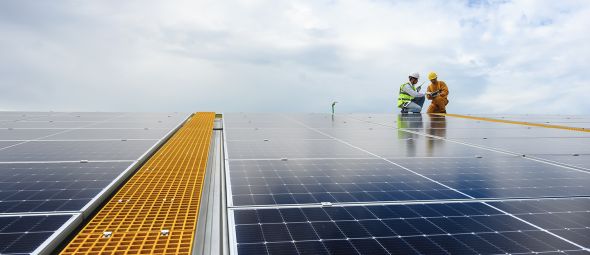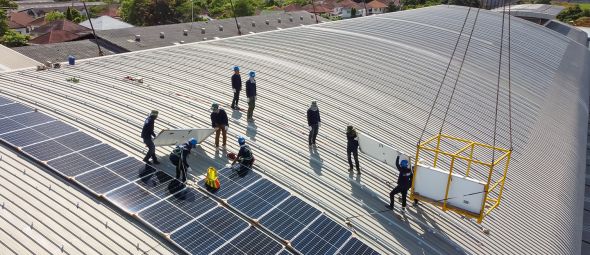Overview
Governments and businesses alike are making changes to energy production and infrastructure, including increased investments in emerging energy technologies, alongside pivotal shifts in traditional energy sectors. These changes have implications for workers and their communities, affecting access to quality jobs and training opportunities, which in turn can help or harm local economic resilience and broader economic outcomes. New research highlights how policymakers, employers, and workforce and economic development leaders can help transition energy systems to support strong employment opportunities aligned with labor market needs.
Featured Content

Skills and training, Energy transition
Last updated on March 31, 2025
Research Summary
What High-Quality Local Jobs Are Available as Fossil Fuel Work Disappears?
As carbon-intensive jobs disappear, workers in these roles need high-quality jobs to sustain their livelihoods. This study identifies alternative jobs and associated skills that fossil fuel workers will need to transition into new employment within communities dependent on the industry.
Last updated on March 31, 2025

Worker voice, representation, and power, Energy transition
September 01, 2023
Research Summary
Unionized Energy Workers Concerned About Employment Frictions with Transitions to Renewable Energy
Research finds that unionized energy workers are concerned about transitions from fossil fuels to renewable energy industries, emphasizing the role that workers must play in climate change policy discussions.
September 01, 2023

Economic context, Workers in the South, Energy transition
April 14, 2023
Research Summary
Green Energy Jobs Are Growing and Could Unlock Opportunity for Workers
Green jobs in wind and solar energy are more common than ever before, bringing higher wages to workers, especially in parts of the country worst affected by the decline in fossil fuel extraction.
April 14, 2023
Latest Content

Skills and training, Energy transition, Young workers, Support during upskilling
December 05, 2023
Article
Ensuring the American Climate Corps Is Rooted in Justice and Built for Mobility
The newly announced American Climate Corps—a multiagency job training initiative in the growing fields of clean energy, conservation, and climate resilience—has a major opportunity to spur local workforce partnerships, build diverse talent pipelines, and tackle climate change.

Worker voice, representation, and power, Energy transition
September 01, 2023
Research Summary
Unionized Energy Workers Concerned About Employment Frictions with Transitions to Renewable Energy
Research finds that unionized energy workers are concerned about transitions from fossil fuels to renewable energy industries, emphasizing the role that workers must play in climate change policy discussions.

Worker voice, representation, and power, Energy transition
June 07, 2023
Article
A National Industrial Policy Could Strengthen a Manufacturing Resurgence Underway
A national industrial policy could take on challenges that unions and business can’t fix on their own, according to Bill Dirksen, a member of the WorkRise Leadership Board and retired labor negotiator with Ford Motor Company.

Economic context, Workers in the South, Energy transition
April 14, 2023
Research Summary
Green Energy Jobs Are Growing and Could Unlock Opportunity for Workers
Green jobs in wind and solar energy are more common than ever before, bringing higher wages to workers, especially in parts of the country worst affected by the decline in fossil fuel extraction.

Economic context, Energy transition, Support during upskilling
November 22, 2022
Article
How Can the Forces of Change Be Harnessed to Create an Inclusive and Equitable Labor Market?
Greater public and private investment in job training, policies to support unionization, and efforts to close digital divides are core strategies for transforming risks from climate change and automation into opportunity, noted experts at the WorkRise October conference.